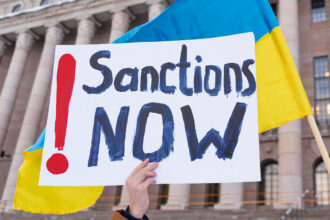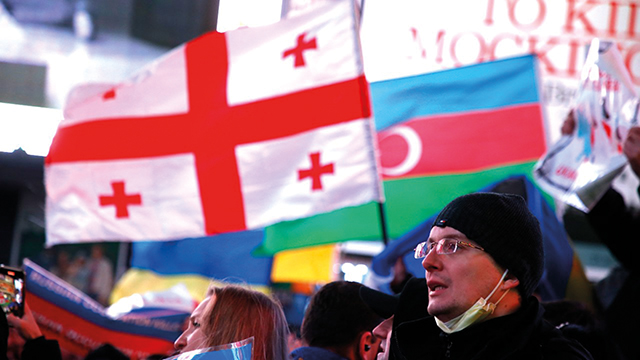In the South Caucasus, Russia has made many military advances in the last two decades. However, its reputation as a power is decreasing. The military is increasingly used to formulate foreign policy in the region. The result is an extremely shaky position based solely on hard-power.
The position of Russia in the South Caucasus has been deemed solid, particularly after the second Nagorno Karabakh War in 2020, where 2000 Russian peacekeepers stationed themselves in Nagorno Karabakh. Moscow has a unique influence in the South Caucasus: it has four military bases spread across three states. This leaves little room for outside powers. The military power of Russia is a major constraint on NATO and US forces in the Black Sea region.
Under this powerful position, however, lies a host of long-term issues. Some of these problems are already apparent, while others will be soon. Moscow’s position, in the end, is not well-founded. It is becoming more dependent on the military and is less interested in using other tools to maintain its positions in the South Caucasus.
The nature of the peace that Russia has brought about is one of the most striking aspects of its rather unstable position. It is essentially a “geopolitical” peace, meaning it is highly insecure and likely to be short-lived. There are many reasons, but it is important to realize that building a long-term peace requires a genuine political will, prestige, as well as exemplary leadership. Moscow is not interested in a resolution to the conflict, because it would limit its power projection.
Geopolitics is therefore driving the Kremlin’s thinking. Military and geoeconomic considerations are more important than regional security concerns. Then there are simmering tensions between Armenian and Azerbaijan. The Kremlin can use the discord between Yerevan, and Baku to reap benefits that have been elusive so far. Tensions can be used to convince both Armenia and Azerbaijan that peacekeepers should stay longer and possibly increase the number of Russian soldiers.
The Russian peace is geopolitical, because it views the railway revitalization project, announced in November 2020 as part of the deal between Russia and Armenia, Azerbaijan and Azerbaijan primarily through a militaristic lens. The issue of restored economic links is raised, but the credibility that Russia hopes to achieve through railway connections with Armenia and Turkey is far from clear. It is easier to trade with Turkey through the Black Sea. With Armenia, the Georgian Route, although sometimes unreliable due to weather, has worked for decades.
The military aspect of the restored railway lines is more appealing to Russia. This would allow Moscow the ability to penetrate the South Caucasus at any time to reduce the blocking power of Caucasus range. Russia’s military plan is centered on its ability to reach the Turkish and Iranian border.
Armenia is another area where Russia may lose out in the long run. Both sides are ebullient in their ongoing talks between Yerevan and Ankara, despite Armenia’s dependence on Russia both economically and militarily. The Russian troops in Armenia are not going to be affected in the long term. However, the newly opened border with Turkey will allow Armenia to diversify their economy and lessen its dependence on Russia. Diversification of economic and connectivity equals a diminution of Russian influence. Russia cannot prevent other powers from entering this region. Turkey is an excellent example.
What Russia might be trying to achieve in the South Caucasus is perhaps the best indicator of its changing position. Some thoughts on global processes may shed light on Moscow’s thinking. The world is likely to consist of two major centers, the US, and China. These will be surrounded with several closely aligned nations. Washington has taken steps in this direction with the recent Australia-UKUS tripartite agreement (AUKUS). Along with China and the US Russia, India Turkey and Iran are also trying to create small near-geopolitical areas along their borders. Their efforts will be closely tied to Washington or Beijing’s interests. The future world order will likely be more chaotic. It will also be a hierarchical order, with China and America taking the lead and others having less influence. This will still form the Eurasian Order.
South Caucasus is likely to be at the heart of these global changes. The region is bordered on three sides by major players in the Eurasian continent, namely Russia, Iran, and Turkey. These three countries are all driven by regional ownership concepts. The new world order is likely to lead to a new order being established in the South Caucasus. This will be pursued by Russia. Russia, aware of its limitations and the fact that it’s impossible to create a new exclusive order like the one the Romanovs created or the Soviets implemented before, has to give up some of its ambitions in order to pursue a more nuanced approach to foreign policy. The order will be built on a closer collaboration with Turkey and Iran. Ankara will recognize the hegemony of Moscow. Moscow will also acknowledge the major interests of these two powers. As was the case in other situations, the order will be characterized by both competition and cooperation. Overall, however, the red lines set by these three powers will be mostly respected. Regional ownership will be the driving force to minimize disagreements and maximize incentives for cooperation.
Overall, Russia’s position is not as solid in the South Caucasus as it is often portrayed. Moscow must adapt to the changing challenges in order to maintain its influence. The creation of more military bases is a way to maintain influence in the region. A clear example is the deployment by Russia of peacekeepers in Nagorno Karabakh. This is a sign of power to many, but it also reveals weakness and an inability to solve problems with the prestige that comes with any aspiring great powers.
Emil Avdaliani: Analysis
Emil Avdaliani, a professor of European University, is also the Director of Middle East Studies for Geocase.
Read More @ georgiatoday.ge




